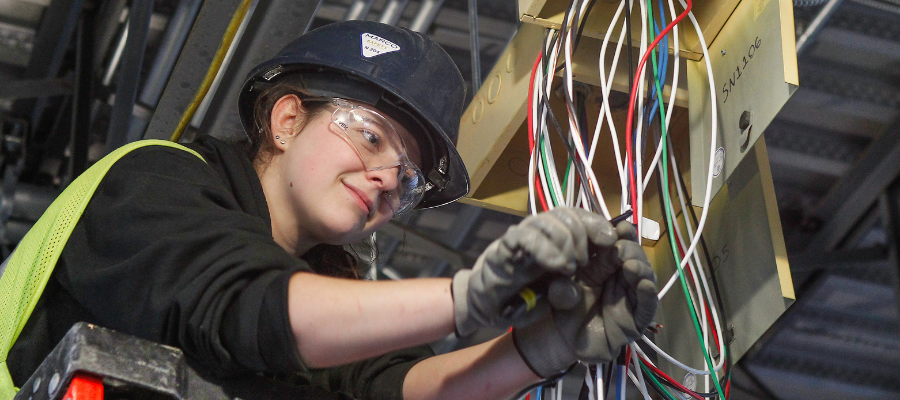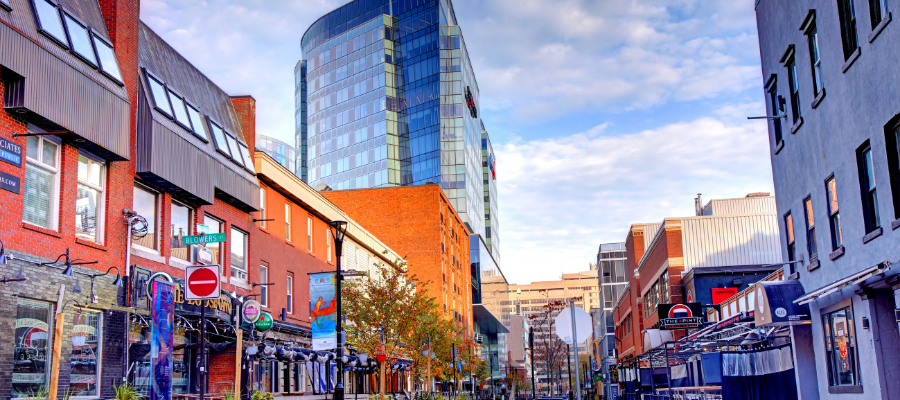On April 5th, the Halifax Chamber of Commerce hosted Mayor Mike Savage of the Halifax Regional Municipality (HRM) for our Annual State of the Municipality event, where over 600 attendees heard from the Chamber President, Patrick Sullivan, Halifax Partnership CEO, Wendy Luther, and the Executive Director of the Black Cultural Centre, Russell Grosse.
The mayor’s speech, which covered a number of topics, including population growth, employment, education, business attraction, housing, homelessness, tourism, transportation, climate change, security, taxation, and infrastructure, left attendees with a message a hope and optimism. “I think we will look back on a decade of progress,” said Mayor Savage.
Halifax’s population grew by 4.5 per cent last year, adding an additional 21,000 residents, for a total population near 480,000. A decade ago, Halifax was struggling with youth retention and an aging population, today the city’s population is younger, more diverse, and more educated than ever before, said the mayor.
The mayor also referenced the significant level of development within the city centre over the past decade, showcasing the differences between the city’s skyline from 2012-2020. Mayor Savage also addressed the growing housing crisis, citing improvements made to the permit approval process for multi-unit residential and low-density housing units. In addition to housing, the mayor spoke to other major infrastructure projects that would improve transportation throughout HRM, including the Cogswell District and the city’s Integrated Mobility Plan.
The luncheon finished off with a Q&A between Chamber CEO Sullivan and Mayor Savage:
Q1. Housing continues to be a major issue in the HRM, and with an expectation of continued population growth, it will continue to be a focus. Is there a long-term solution in your mind, and what more can the Municipality do to accelerate housing, including attainable housing?
A1. Every city is facing challenges with housing, and we can manage ours. The city has been working on this for some time through our Centre Plan, which will help support our development community. There’s room in areas for many housing units and Council has consistently supported development and approved thousands of units. Through collaboration with the province, we can better address these problems. Sacrifices will have to be made to make room for newcomers, but we also have to care for our green spaces.
Q2. The North American Indigenous Games may be the single biggest event the city has hosted. How excited are you for this event and what do you think the impacts will be on the city? Are we ready for it?
A2. There’s nothing I’m more proud of than our relationship with the Mi’kmaq community. As part of the games, we will learn about and interact with a number of different cultures, and I think its going to be transformative. The other big sporting events brought notoriety, but this event will be one of the true highlights of the year.
Q3. Climate change is a reality, and HalifACT is a progressive strategy to help us move forward as a community. Are you pleased with the city’s progress on climate change and the move to net zero. Is the business community fully engaged on this issue and what more needs to be done to move the needle more quickly?
A3. The idea of the CEO Climate Action Charter came from Don Bureaux at NSCC. Through the Ecology Action Centre, we did engage with the business community, but more needs to be done. We have to act on the climate because of our proximity to the ocean. There’s more work that needs to be done.
Q4. The Nova Scotia provincial/municipal relationship has always been a tenuous one. As you travel the country and the world and talk to municipalities, have you seen different structures that manage that interaction better? And what would you change if you could?
A4. The relationship between the Province and the city needs to be robust, and I’ll work with anybody. I’ve worked with past and present premiers and prime ministers. We are working with the housing task force, Joint Regional Transportation Agency, and other provincial initiatives. We can’t solve climate issues without financial support from the province, so we need to put egos aside and be reasonable to solve issues together.
Q5. What do you see as the most significant emerging challenge for Halifax, and what needs to be done about it now?
A5. We need to keep bringing in newcomers to the region and treating everyone here with respect. That comes from housing and social equity. We can address the big issues as a community. We are on the right track and will continue to grow and welcome people from around the world.






